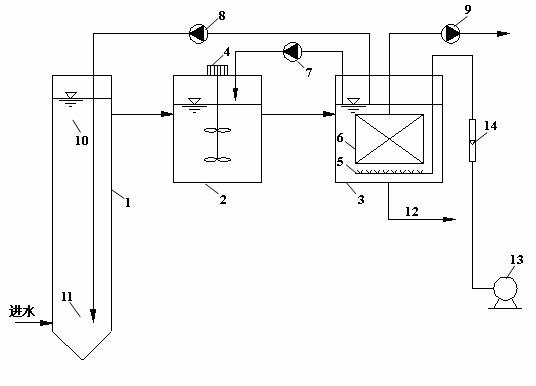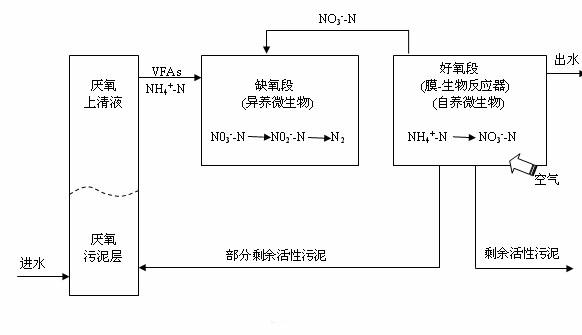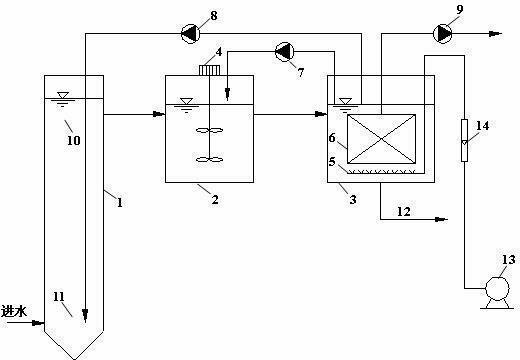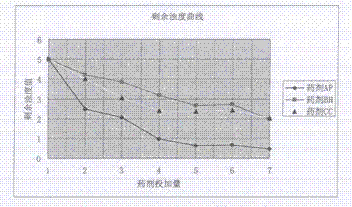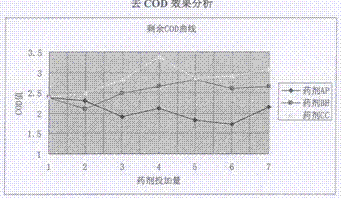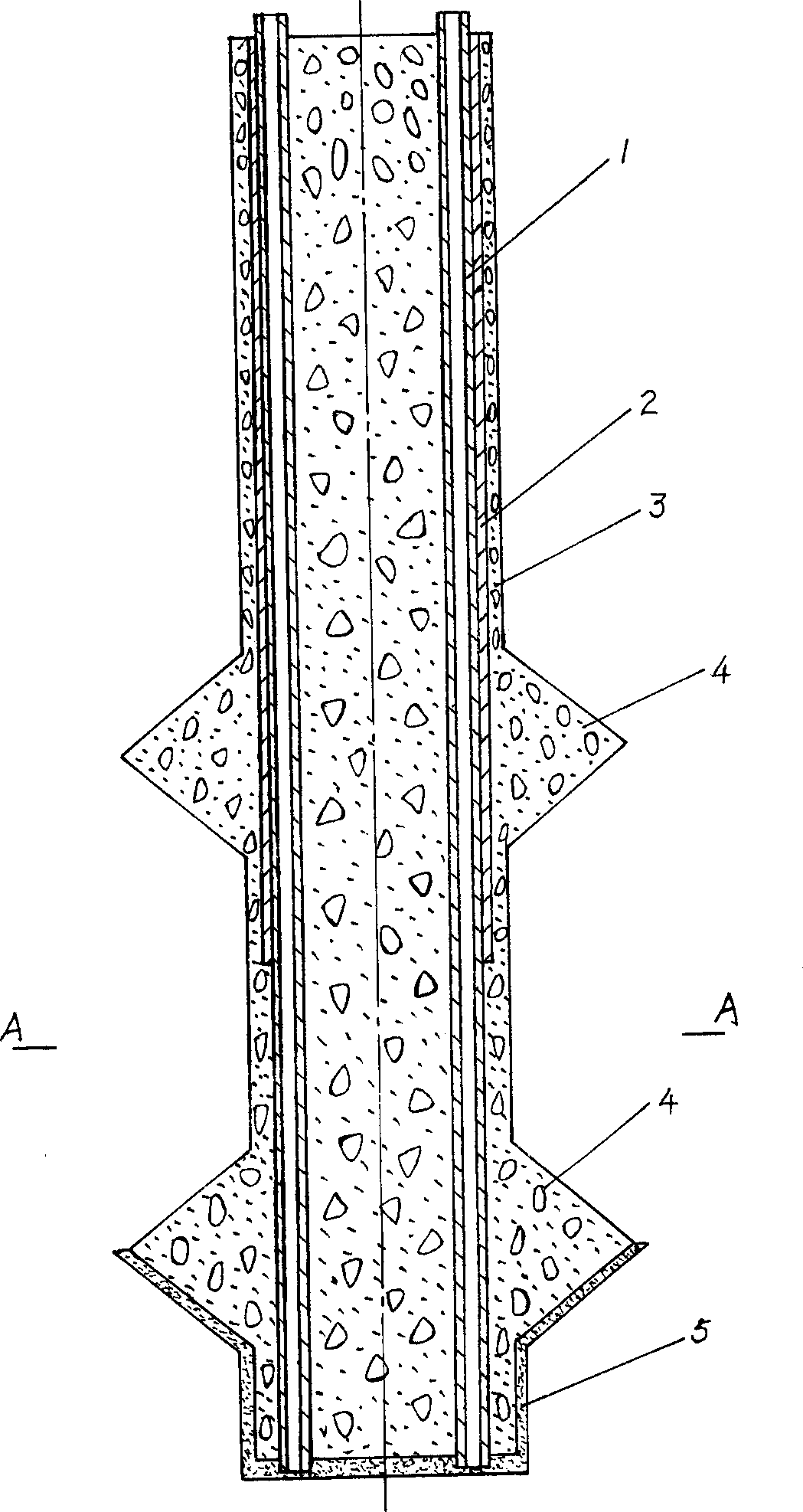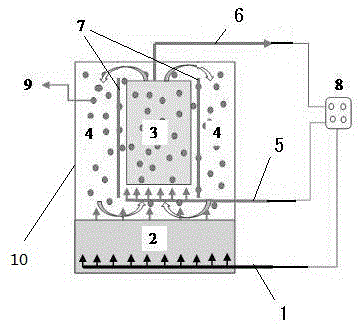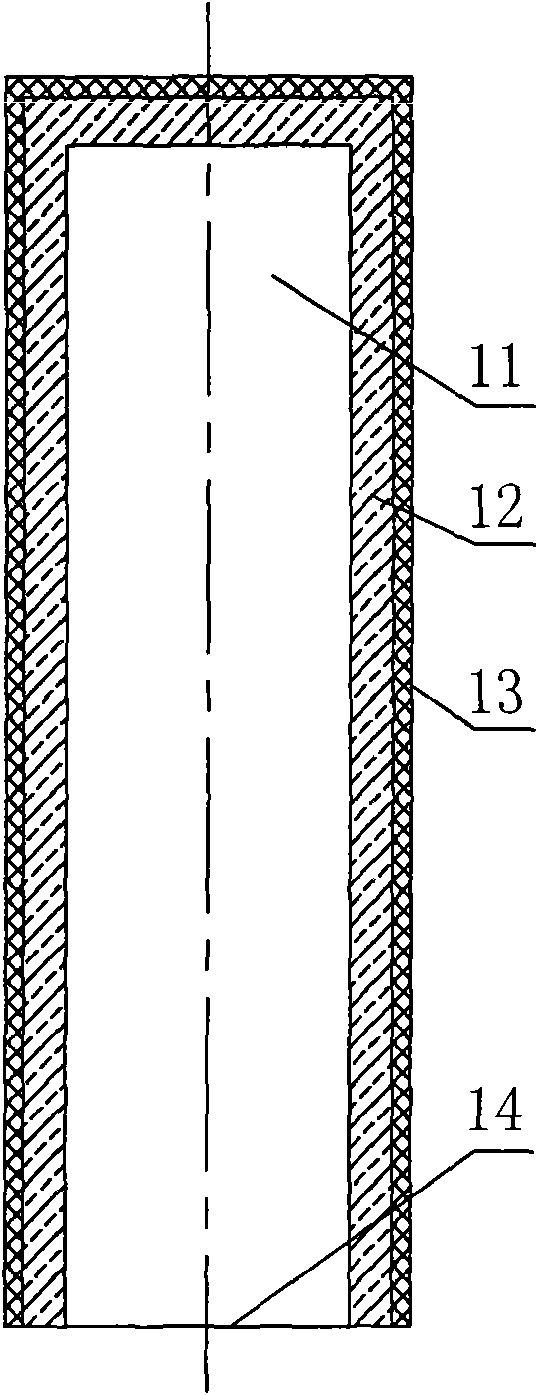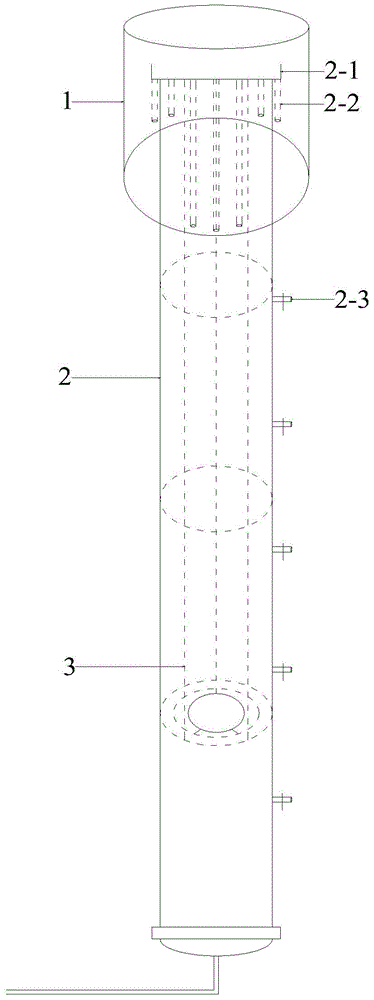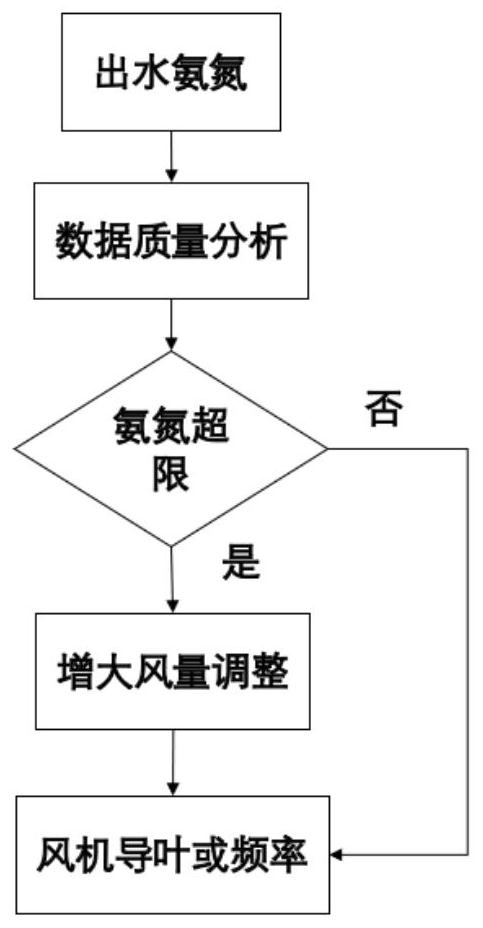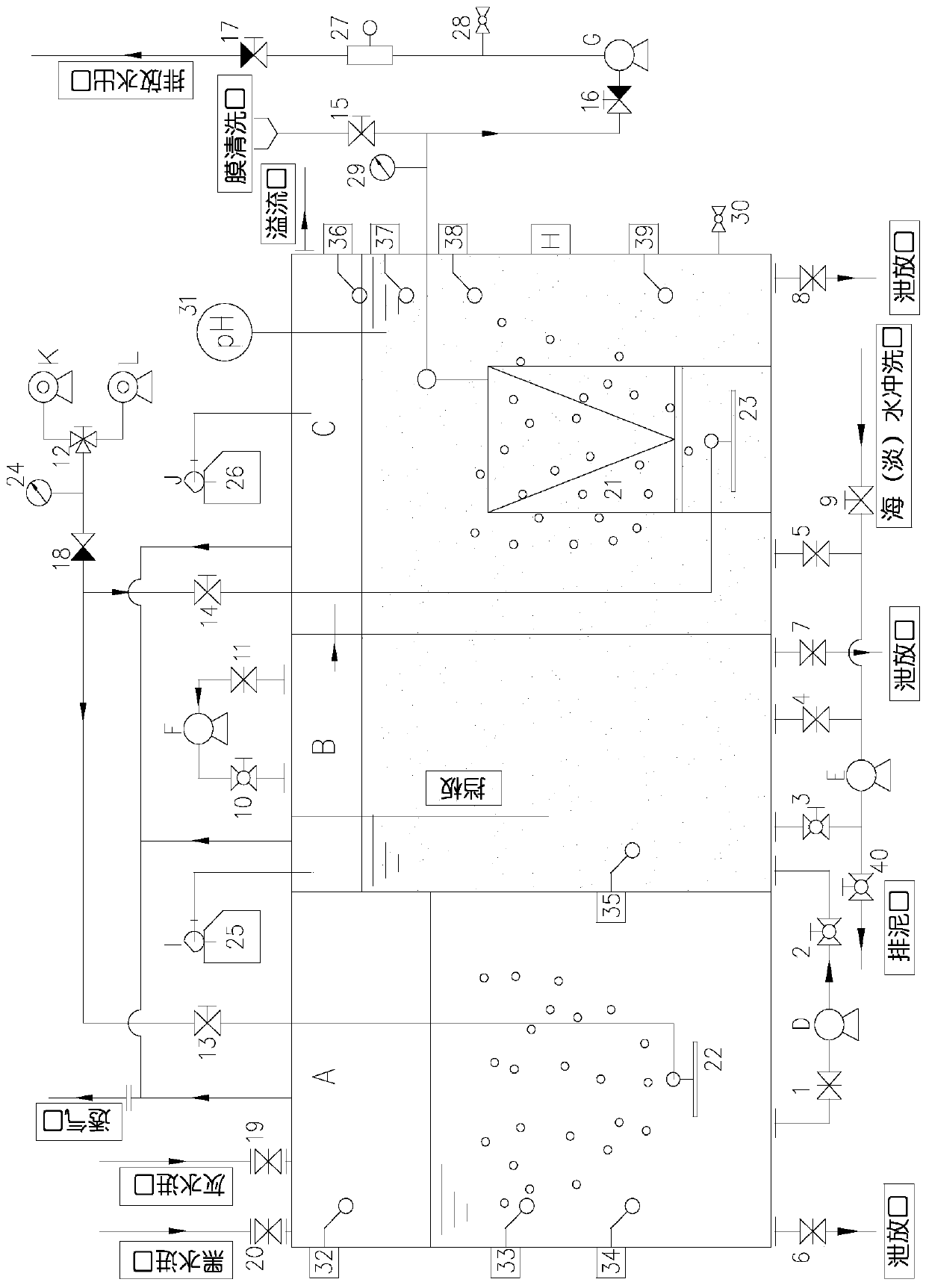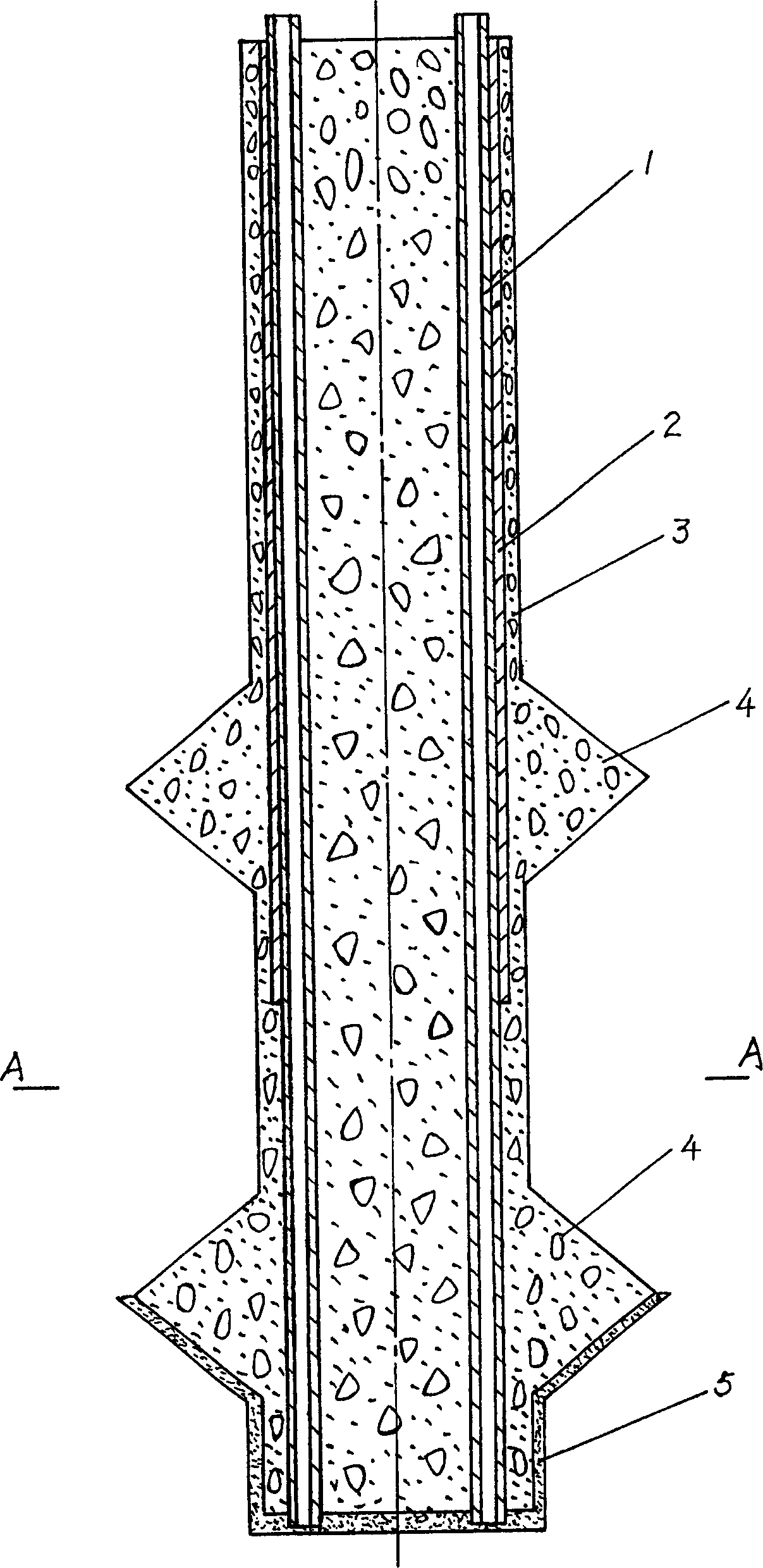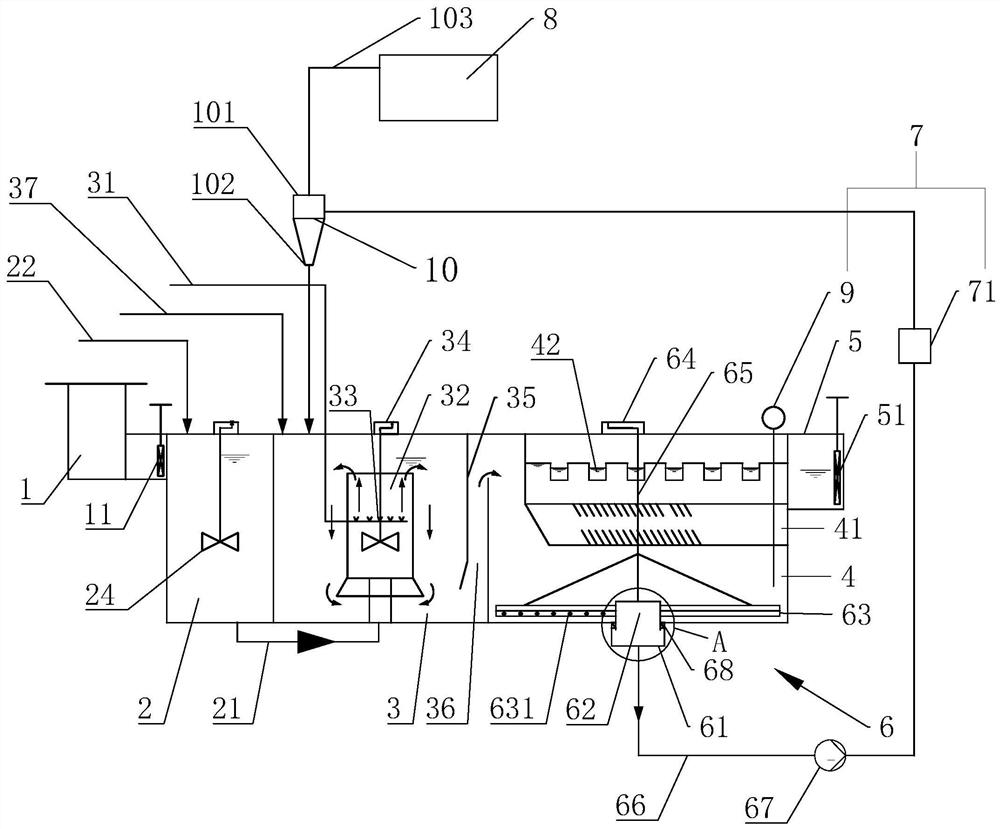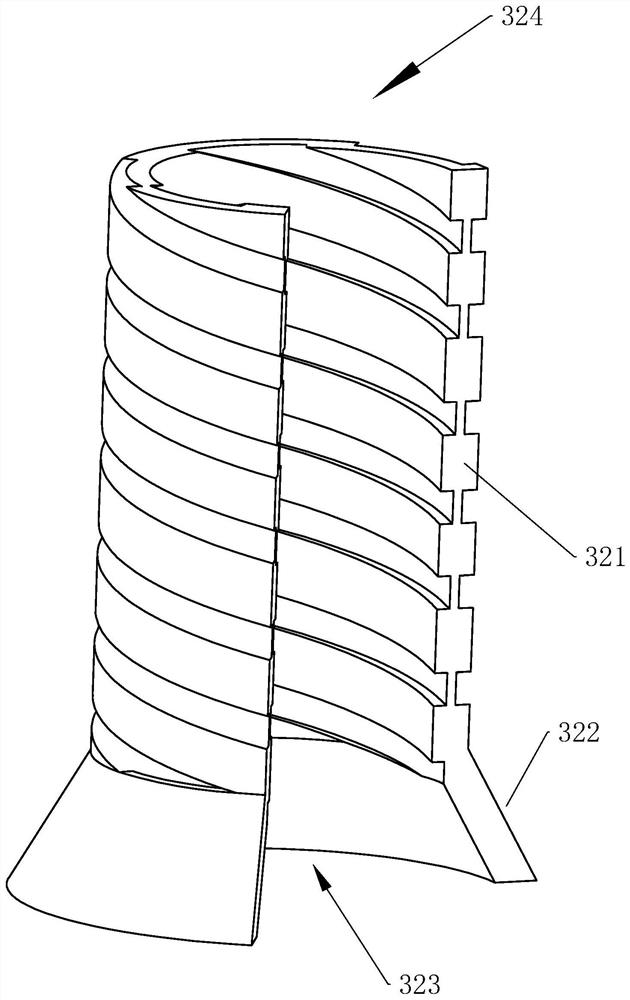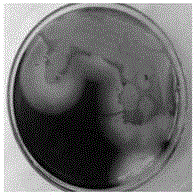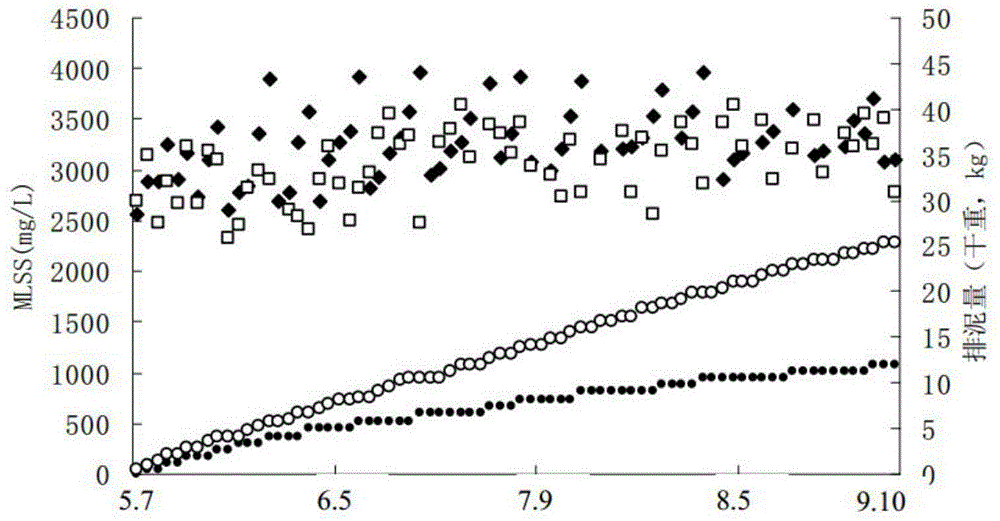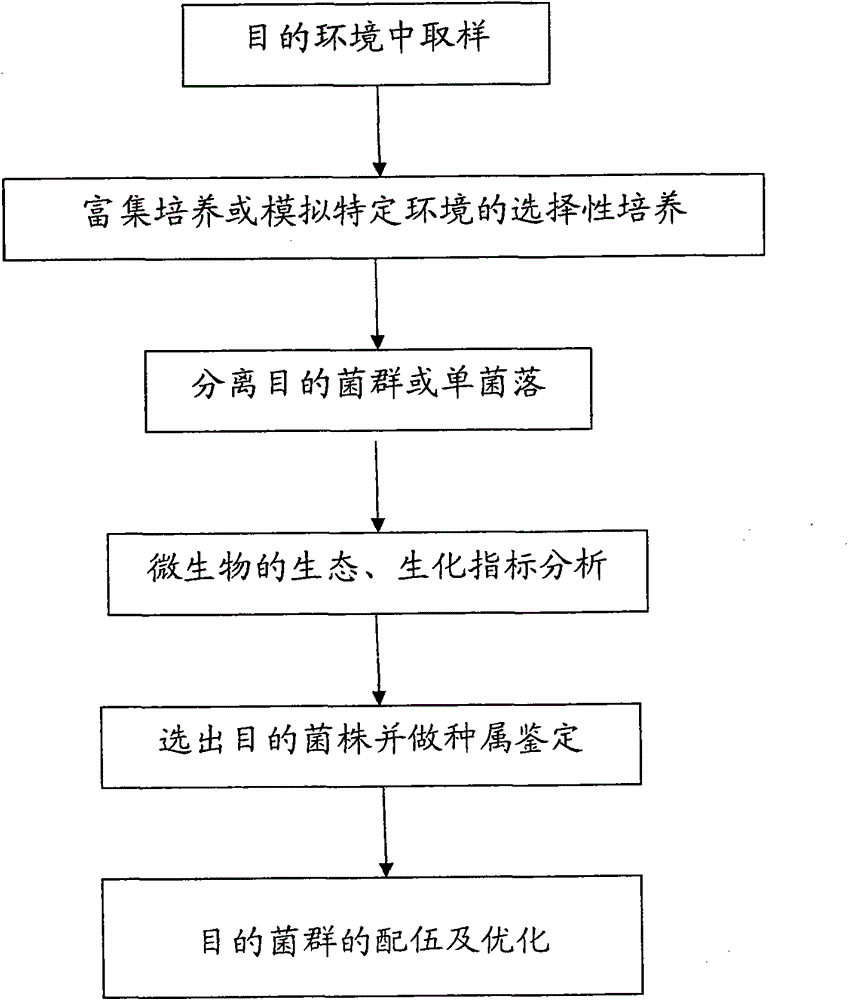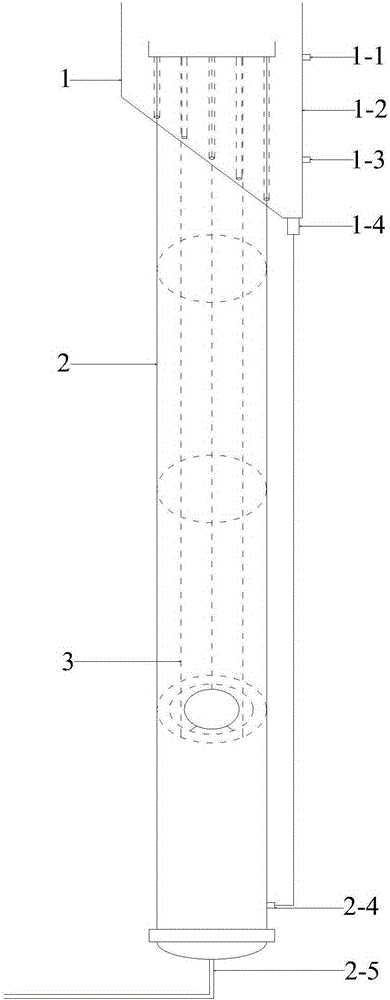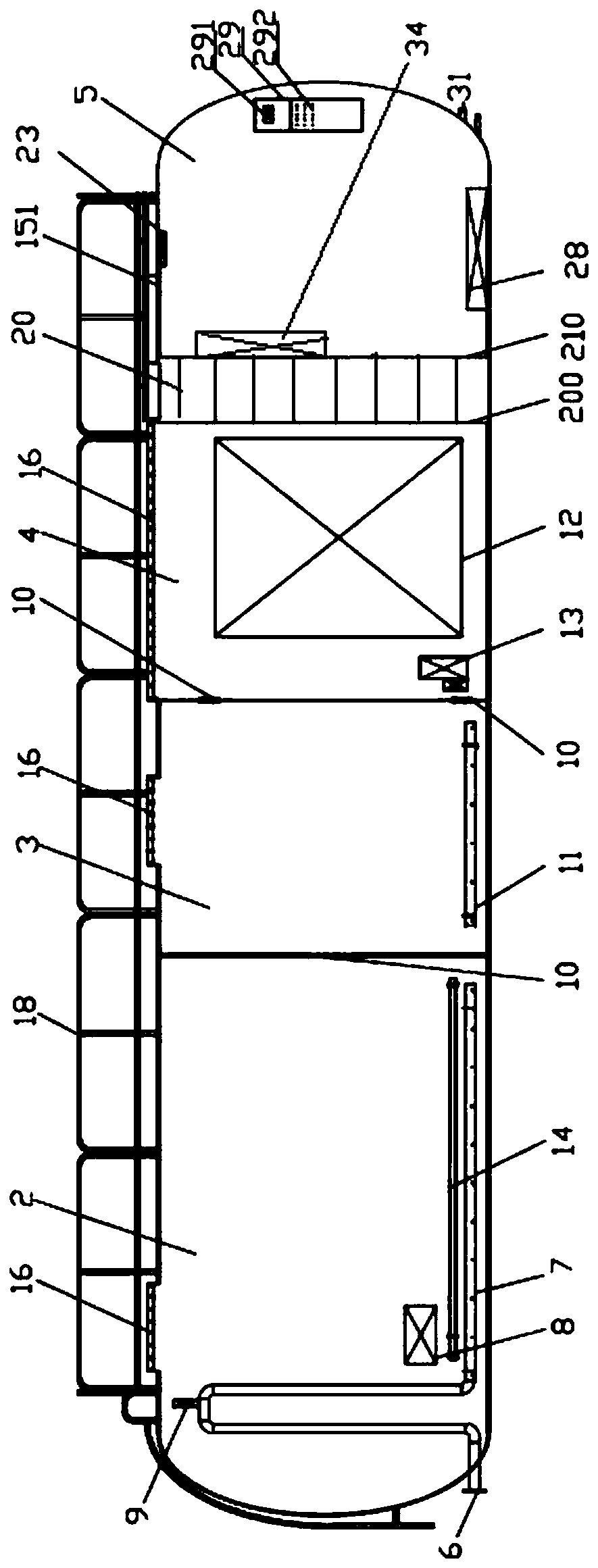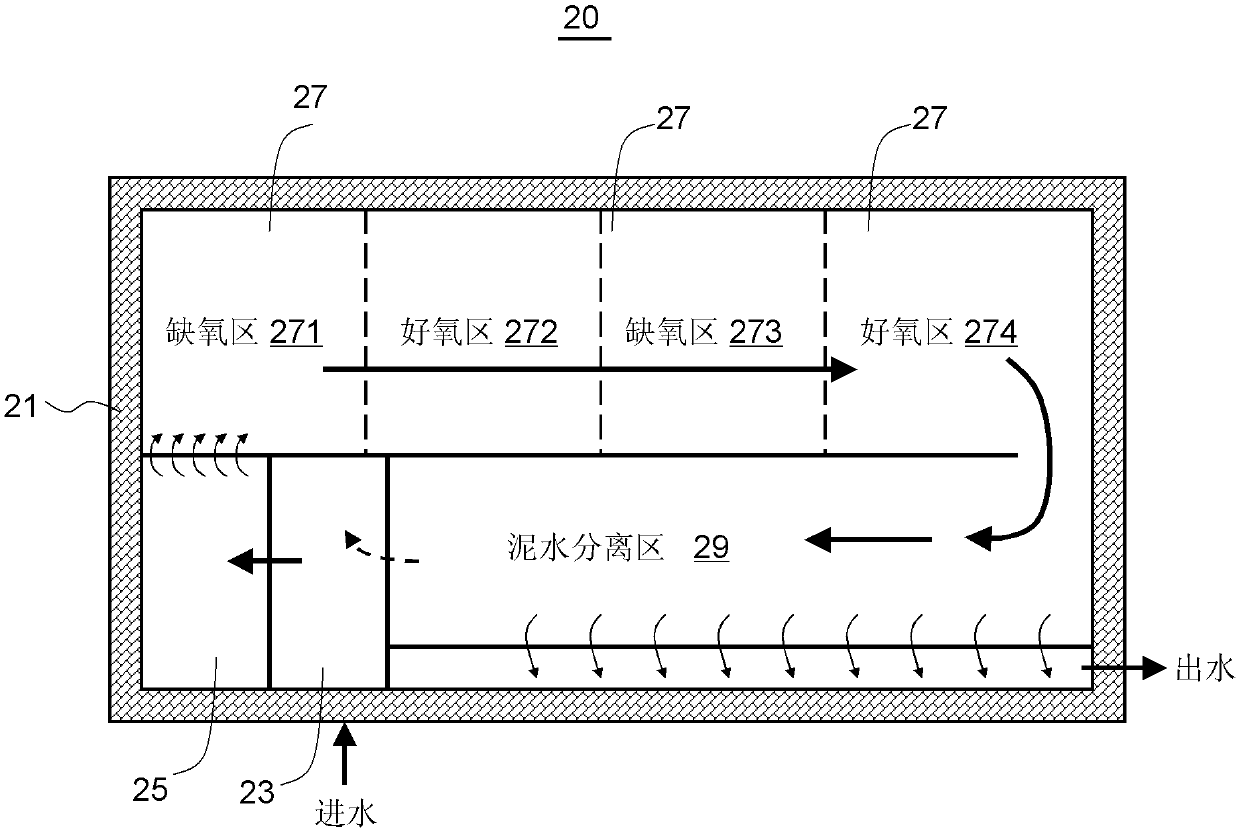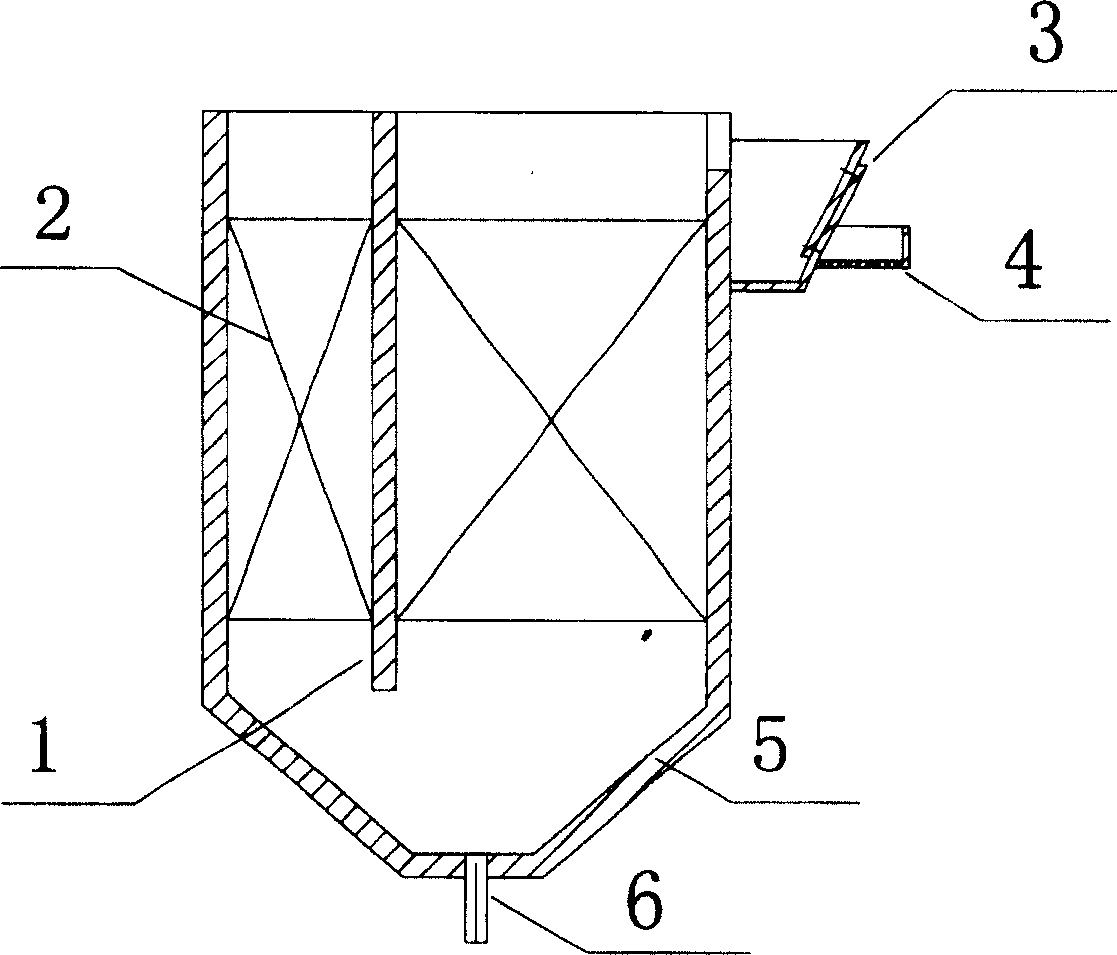Patents
Literature
Hiro is an intelligent assistant for R&D personnel, combined with Patent DNA, to facilitate innovative research.
39results about How to "Reduce sludge discharge" patented technology
Efficacy Topic
Property
Owner
Technical Advancement
Application Domain
Technology Topic
Technology Field Word
Patent Country/Region
Patent Type
Patent Status
Application Year
Inventor
Process for enhancing denitrogenation of membrane bioreactor by anaerobic fermentation acid production
InactiveCN102502959APromote denitrificationAchieve reductionTreatment with anaerobic digestion processesActivated sludgeFiltration
The invention relates to a process for enhancing denitrogenation of a membrane bioreactor by anaerobic fermentation acid production. The process adopts an enhanced anaerobic tank, an anoxic tank and an aerobic tank. After entering the process, the sewage undergoes biochemical treatments including anaerobic fermentation, anaerobic denitrification and aerobic nitrification under the action of different kinds of microorganisms, and finally the effluent is sucked and collected by membrane filtration. By optimizing the growth environment of microorganisms in the anaerobic section, the process, on the one hand, promotes hydrolysis acidification of particle-stage organic matters (including colloid-state organic matters), slowly-degradable organic matters and hardly-degradable organic matters in the raw sewage, and on the other hand, produces acids from the excessive activated sludge which is discharged to the anaerobic tank to provide high-quality carbon sources for anaerobic denitrification. Besides, the process enhances the biological denitrification process by increasing sludge concentration, solves the problem of insufficient carbon source in biological denitrification process, and achieves the purpose of removing total nitrogen from the sewage with high efficiency by virtue of high-efficiency cut-off and separation characteristics of the membrane. The process can supplement carbon sources to the denitrification section for enhanced denitrogenation by fully utilizing converted carbon sources in the incoming water and carbon sources generated by sludge fermentation in the process without needing extra carbon sources. The process is simple and flexible in control, and the total nitrogen in the effluent can reach or exceed the first-class (A-class) discharge standard.
Owner:TONGJI UNIV
A regenerated water manufacturing device and method based on electrolysis and double-membrane technology
InactiveCN102260013AImprove water qualityTo achieve the purpose of cleaner productionWater/sewage treatmentMultistage water/sewage treatmentWater basedWater quality
Provided is an apparatus for producing reclaimed water based on electrolysis and double membrane technologies. The apparatus is disposed with an electrolysis system, an MBR system and a reverse osmosis system. Further provided is a method for producing reclaimed water using the apparatus, comprising the following steps: retrieving biochemical sewage through a water pump (12) and inputting the biochemical sewage into an electrolysis apparatus (13) of the electrolysis system to be electrolyzed, then enabling the sewage to enter an MBR reaction tank (26) through a grid (22) to obtain primary reclaimed water, pumping the primary reclaimed water into the reverse osmosis system with a high pressure pump (45) to separate dialysis water and concentrated water, enabling the dialysis water to enter a reclaimed water storage tank (48) to obtain ultrapure reclaimed water, enabling a part of the concentrated water to flow back for cyclic membrane filtering and separation, enabling a part of the concentrated water to flow back to enter an electrolysis procedure for cyclic use, and discharging the rest part of the concentrated water.
Owner:BOYING XIAMEN SCI & TECH
Wastewater biological treatment system based on bio-contact oxidation process
ActiveCN104045154ASmall footprintAvoid depositionTreatment with aerobic and anaerobic processesBiofilmSludge
The invention provides a wastewater biological treatment system based on a bio-contact oxidation process, and belongs to the technical field of wastewater biological treatment. The biological wastewater treatment system includes a processing pool, a water inlet zone, a promote zone, an aeration zone and a slurry and water separation zone; the water inlet zone, the promote zone, the aeration zone and the slurry and water separation zone are integrally arranged in the processing pool, the aeration zone is configured to include a plurality of sub partitions, and a biomembrane filler is placed in each sub partition; two or more of the three of an anoxic zone, an anaerobic zone and an aerobic zone are arbitrarily combined to form the plurality of sub partitions. The biological wastewater treatment system has the advantages of good denitrification effect, high efficiency of sewage treatment, less sludge deposit, wide applicable range, and biological multiplication process.
Owner:JIANGSU RUISHENG WATER TREATMENT
Process used for refluxing coagulating sedimentation of mud residues in common inclined-tube settling tank
InactiveCN101850193AEasy to transformReduce dosageSedimentation separationFlocculationReclaimed water
The invention discloses a process used for refluxing coagulating sedimentation of mud residues in a common inclined-tube settling tank, which relates to a recycling treatment process of urban reclaimed water and a reconstruction technique of the common inclined-tube settling tank. In the process, by using a principle that mud residue refluxing increases the collision probability of particles during coagulation and improves a dynamic condition of flocculating settling, part of the mud residues at the bottom of the settling tank is directly refluxed into a mixing tank of a previous section of the process, and simultaneously a 1# coagulating agent is added into the mixing tank, and a 2# coagulating agent is added into a third-stage flocculation tank; after passing through a fourth-stage flocculation tank, the mud residues enter the inclined-tube settling tank through a perforated wall to perform mud-water separation; water is yielded after the mud residues are converged by a header tank, the residual mud residues are discharged out from the bottom part through a mud discharging well after being settled by the settling tank, and part of the mud residues is directly refluxed into the mixing tank by the settling tank to realize the continuous operation of the process. The process is suitable for the recycling treatment of the reclaimed water and the upgrading of the common inclined-tube settling tank. The process can reconstruct the original inclined-tube settling tank of a reclaimed water plant simply and conveniently, and does not need to change the original buildings; the addition of the coagulating agents can be saved by about 50 percent; the yielded water has good water quality, the yield water turbidity is lower than 2 NTU, and the yield water total phosphorus is lower than 1 mg / L; and the mud discharge cycle is long, the water for mud discharging is saved by over 90 percent, and the processing efficiency is high.
Owner:TIANJIN URBAN CONSTR COLLEGE +3
Non-phosphorus solid slow-release corrosion inhibitor
The invention provides a non-phosphorus solid slow-release corrosion inhibitor. The non-phosphorus solid slow-release corrosion inhibitor comprises 20%-30% of boric acid, 25%-35% of borax, 10%-20% of Na2O, 15%-25% of SiO2, 5% of Na2SO4 and 5% of (NH4)6Mo7O24. The corrosion inhibitor provided by the invention is the non-phosphorus corrosion inhibitor, the content of phosphate in water is decreased beneficially, and the eutrophication risk of receiving water is reduced; aiming at the acidic water quality (pH is larger than or equal to three), the medium-high-salinity water quality (the content of Cl- is smaller than or equal to 0.5mol / L) and the medium-high-alkalinity water quality (the content of CaCO3 is smaller than or equal to 250mg / L), the corrosion inhibitor is researched and developed, and corrosion of carbon steel materials in the acidic water quality environment, the medium-high-salinity water quality environment and the medium-high-alkalinity water quality environment can be effectively inhibited; and the corrosion inhibitor belongs to a slow-release medicament, and the corrosion inhibition effect of the medicament lasts for 30 days or more.
Owner:BEIJING NORMAL UNIVERSITY
Pipe type membrane element and submerged membrane bioreactor
InactiveCN101874987AHigh mechanical strengthAvoid breakingSemi-permeable membranesWater/sewage treatment bu osmosis/dialysisMembrane bioreactorMembrane configuration
The invention discloses a pipe type membrane element and a submerged membrane bioreactor. The submerged membrane bioreactor comprises a reaction tank and a membrane element, wherein the membrane element is positioned in the reaction tank and comprises an inner cavity and a water-permeable cylindrical supporting layer; the outer surface of the supporting layer is wrapped with an organic filter membrane layer; the upper end of the inner cavity is closed, and the lower end of the inner cavity is provided with a water outlet; and the reaction tank is also internally provided with a water collecting disk connected with the water outlet of the membrane element. The invention is difficult to break and block and can effectively reduce the cost of the membrane element and decrease the times of chemical cleaning, thereby prolonging the service life of a membrane and reducing the operation cost.
Owner:上海膜达克环保工程有限公司
Preparation method and application of water treatment agent
InactiveCN106902743AWith coagulation functionDoes not affect the adsorption effectOther chemical processesWater contaminantsSludgeCoagulation function
The invention relates to the technical field of water treatment. In order to solve the problems that an adsorbent is expensive, and the sludge quantity is doubly increased and the sludge treatment cost is increased after excessive adsorbents are added, the invention provides a preparation method and application of a water treatment agent. The preparation method comprises the following steps: performing organic modification on powder and an organic modifier by a modifying machine to obtain organic modified powder; adding an inorganic modifier and an organic modifier sequentially or simultaneously, stirring, adding the organic modified powder, or adding an inorganic modifier and an organic modifier sequentially or simultaneously, stirring, adding the organic modified powder and stirring to obtain the water treatment agent. Adsorption and coagulation functions are unified, the use efficiency of the water treatment agent is greatly improved, the cost is reduced, and the equipment management difficulty is reduced.
Owner:常涛
Cast-in-situ pedestal pile with variable bearing and its construction method
A cast-in-situ pedestal pile for building, bridge and foundation is composed of concrete pile column, reinforcing bar cage in the said pile column, grouting pipe bound to the said reinforcing bar cage, and several variable supporting disks. Its forming method includes such steps as drilling hole of pile, squeezing and expanding to form variable supporting disks, putting reinforcing bar in the hole of pile, pouring concrete into pile hole and supporting disks, and cement grounting the pile bottom and supporting disk under sides. Its advantages include high load-bearing capacity and low drained slurry.
Owner:赵书平
Method for treating municipal sewage by adopting millipore FBR (Filter Bio-reactor)
ActiveCN102070279AMeet the requirements of emission standardsLess investmentMultistage water/sewage treatmentEmission standardMunicipal sewage
The invention discloses a method for treating municipal sewage by adopting a millipore FBR (Filter Bio-reactor), belonging to the technical field of resources and environments. The municipal sewage can be treated by adopting a mode of combining aerobic denitrification with a dual-layer millipore filter tank in the method, thus pollutants, such as NH3-N, TN (Total N), COD, SS, TP (Total Phosphorus) and the like, in the municipal sewage can be greatly effectively reduced, the treated discharge water can reach the national earth surface IV class water standard, wherein CODCr is not more than 30mg / l, NH3-N is not more than 1.5mg / l, the total N (lake, reservoir, in the terms of N) is not more than 1.5mg / l, the total phosphorus (in the terms of P) is not more than 0.3mg / l, and the potassium permanganate index is not more than 10. The discharge water can be directly discharged in an earth surface riverway so as to reduce the environment pollution and meet the requirement on the increasingly improved municipal sewage emission standard. The invention can be applied to building municipal sewage treatment plants and modifying and reconstructing the traditional sewage treatment plants.
Owner:JIANGSU XIANTONG ENVIRONMENT TECH
Stainless steel cleaning passivator and application thereof
PendingCN111926338AAchieve recyclingReduce sludge dischargeMetallic material coating processesOrganic acidActive agent
The invention relates to a stainless steel cleaning passivator and application thereof. The stainless steel cleaning passivator is prepared from the following components of, in percentage by mass, based on the total weight of the stainless steel cleaning passivator, 10%-40% of organic acid, 5%-10% of organic acid salt, 1%-5% of surfactant, 1%-5% of chelating agent, 1%-3% of passivating oxidation auxiliary and the balance water; and the passivating oxidation auxiliary agent is alkali metal salt. Acid of the stainless steel cleaning passivator is organic acid, acid mist and waste acid are not generated in the acid pickling process, and the stainless steel cleaning passivator is suitable for rinsing stainless steel through a microelectrolysis oxidation method subsequently, environment-friendly and high in safety.
Owner:绿水新材料科技(苏州)有限公司
Heavy metal sewage treatment system
PendingCN106145444AHigh removal rate of heavy metalsReduce sludge dischargeWater contaminantsMultistage water/sewage treatmentScrew conveyorSewage treatment
The invention discloses a heavy metal sewage treatment system, which successively comprises a neutralization pond, a coagulation reaction pond, a flocculation reaction pond, a separation pond and a recovery system, wherein the neutralization pond and the coagulation reaction pond are independently provided with a stirrer and a metering pump; the bottom of the neutralization pond is connected with the coagulation reaction pond; a baffle is arranged in the separation pond, and is provided with a micro-filtration membrane; the upper part of the separation pond is provided with a drain pipe; the bottom of the separation pond is connected with the recovery system through a screw conveyor. According to the heavy metal sewage processing system disclosed by the invention, a rate of removing heavy metal in sewage is improved, discharge water is improved to achieve a surface water V class standard or above, sludge discharge is reduced, and continuous operation, automation, convenience in installation, small land occupation and low cost are realized.
Owner:SCI RES ACADEMY OF GUANGXI ENVIRONMENTAL PROTECTION
Process for combined treatment on coal chemical wastewater with catalytic ozonation-MBR (membrane bioreactor)
InactiveCN110228898AIncrease profitImprove biodegradabilityWater treatment parameter controlMultistage water/sewage treatmentWater qualityMembrane bioreactor
The invention discloses a process for combined treatment on coal chemical wastewater with catalytic ozonation-MBR (membrane bioreactor). The process comprises the following steps: I, pretreating coalwastewater, and adjusting a pH value; II, inputting the wastewater into a primary catalytic ozonation tower, and carrying out high-class oxidation treatment; III, inputting the effluent of the primarycatalytic ozonation tower into a secondary catalytic ozonation tower, adjusting a pH value, and carrying out high-class oxidation treatment; IV, connecting the exhaust hole of the primary catalytic ozonation tower with the upper end of the secondary catalytic ozonation tower, enabling the effluent of the secondary catalytic ozonation tower the flow back into the primary catalytic ozonation tower,and further oxidizing and degrading organic matters through ozone; V, after the process is circulated for a certain time, carrying out on-line water quality monitoring on the effluent of the secondary catalytic ozonation tower, wherein the biochemistry property of the effluent is up to B / C greater than 0.3; and VI, inputting the effluent of the secondary catalytic ozonation tower into an MBR reaction tank, and directly discharging the effluent of the MBR reaction tank into a water body after detection qualification.
Owner:久沛(上海)环保科技有限公司
Method for removing silicon in negative hardness wastewater
ActiveCN108059223AAccelerated precipitationReduce dosageTreatment involving sedimentationWater/sewage treatment by flocculation/precipitationSludgeSulfate
The invention discloses a method for removing silicon in negative hardness wastewater, the silicon in the negative hardness wastewater is effectively removed, and lime, calcium chloride or calcium sulfate, a coagulant and a flocculant are added and have a synergistic interaction in the efficient settling pond process to remove the silicone. The defects of large dosage of the lime and low silicon removal efficiency in the common process of removing the silicon in the negative hardness wastewater by using the lime are improved, and the efficient utilization of the lime is realized. The method has the characteristics of low silicon content of effluent, low drug consumption, wide range of content of removed silicon, high solid content of the sludge, and small occupied area.
Owner:北京翰祺环境技术股份有限公司
A circulating ao high nitrogen content organic wastewater treatment device based on mbr
ActiveCN104016482BGrowth inhibitionGood removal effectTreatment with aerobic and anaerobic processesAeration rateWater quality
The invention relates to a water treatment device. The invention provides a cyclic AO high nitrogenous organic waste water treatment device based on an MBR. The cyclic AO high nitrogenous organic waste water treatment device based on the MBR comprises a reactor with a water storage cavity and a control device, wherein the reactor is connected with a water inlet device, an aeration device and a membrane water outlet device, a membrane biological reactor is arranged in the water storage cavity of the reactor, the water feeding device comprises a water inlet pope, the aeration device comprises an aeration pipe, the MBR is suspended above the water inlet pipe, the MBR is suspended above the aeration pipe, the MBR is connected with the membrane water outlet device, and the water inlet device, the aeration device and the membrane water outlet device are respectively connected with the control device. The cyclic AO high nitrogenous organic waste water treatment device based on the MBR has the beneficial effects that aeration rate is reduced, less sludge is discharged, control is simple, and daily maintenance management is simple, so that water quality is guaranteed; the MBR is not polluted easily, cost is low, occupying area is small, and maintenance is convenient.
Owner:SHENZHEN ZHONGQING ENVIRONMENTAL TECH
Integrated small town sewage treatment equipment capable of removing phosphorous efficiently by XHBF (Honess Hybrid Biological&Fixed Film Technology)
PendingCN106746346AImprove biodegradabilityImprove phosphorus removal effectTreatment with anaerobic baffled reactorsWater treatment parameter controlTotal phosphorusSewage treatment
The invention discloses integrated small town sewage treatment equipment capable of removing phosphorous efficiently by an XHBF (Honess Hybrid Biological&Fixed Film Technology), which belongs to the field of environmental engineering and sewage treatment. The integrated sewage treatment equipment and a sewage treatment method disclosed by the invention have the advantages that the removal rate of COD (chemical oxygen demand) is 92.8%, the removal rate of TN (total nitrogen) is 98.71%, the removal rate of NH3-N is 98.26%, and the removal rate of TP (total phosphorus) is 99.43%.
Owner:江苏新泓济环保科技有限公司
Tubular membrane element and integral membrane bioreactor
InactiveCN101574626AHigh mechanical strengthAvoid breakingSemi-permeable membranesWater/sewage treatment bu osmosis/dialysisPhysical chemistryMembrane bioreactor
The invention discloses a tubular membrane element and an integral membrane bioreactor. The integral membrane bioreactor comprises a reaction tank and the membrane element positioned in the reaction tank, and the membrane element comprises an inner cavity and a non-watertight cylindrical supporting layer, wherein the outer surface of the supporting layer is coated with an organic filter membrane layer; the upper end of the inner cavity is closed; the lower end of the inner cavity is provided with a water outlet; and the inside of the reaction tank is also provided with a water-collecting tray which is connected with the water outlet of the membrane element. The tubular membrane member and the integral membrane bioreactor are not easy to be ruptured and blocked, and can effectively reduce the cost of the membrane element and the frequencies of chemical cleaning so as to prolong the service life of the membrane and reduce the running cost.
Owner:上海膜达克环保工程有限公司
Vertical continuous flow phosphorus removing device and method
ActiveCN104445616AReduce areaSettling time is shortTreatment with aerobic and anaerobic processesSmall footprintContinuous flow
The invention discloses a vertical continuous flow phosphorus removing device and method. The vertical continuous flow phosphorus removing device comprises a sedimentation tank, a reactor and an adjustable aeration device. The sedimentation tank comprises a water outlet, a sludge and water collecting vessel, a sludge outlet and a sludge particle return hole. The reactor comprises an overflow weir, a flow guide pipe, a sampling hole, a returned sludge inlet and a water inlet. The adjustable aeration device comprises a supporting frame unit, an annular baffle and an aeration ring. The method comprises the steps of firstly, enabling urban sewage to enter an anaerobic region in the reactor through the water inlet, forming intercellular polymers (pha, phb and phv) from an organic carbon source in the sewage by using polyphosphate accumulating bacteria, and meanwhile, absorbing orthophosphate in a water body by cells; then, enabling the sewage to enter an aerobic region, decomposing the intercellular polymers in the polyphosphate accumulating bacteria to generate energy, and meanwhile absorbing the orthophosphate in the water body by the cells to form intercellular orthophosphate; and next, carrying out sludge and water separation in the sedimentation tank, discharging a supernatant solution from the water outlet, returning part of the sludge to the reactor, and discharging the other part of sludge serving as residual sludge. In order to overcome defects of an existing biological phosphorus removing process and device, the invention provides the novel phosphorus removing device and method which are small in floor area, high in phosphorus moving load, good in phosphorus removing effect, low in sludge discharge amount, low in carbon content, environmentally-friendly and economic.
Owner:BEIJING UNIV OF TECH
Enhanced denitrification system and method suitable for high sludge concentration
ActiveCN112723542AReduce adverse effectsEasy loadingWater treatment parameter controlBiological treatment regulationSludgeTotal nitrogen
The invention discloses an enhanced denitrification system and method suitable for high sludge concentration, and belongs to the technical field of sewage treatment. An anaerobic zone, an anoxic zone, an aerobic zone I, a micro-anoxic zone, an aerobic zone II and a membrane pool zone sequentially communicate with one another; the dissolved oxygen concentrations of the aerobic zone I, the micro-anoxic zone and the aerobic zone II are respectively controlled through a DO self-control method; the sludge concentrations of the aerobic zone I, the micro-anoxic zone and the aerobic zone II are detected in real time so as to control the discharge amount of residual sludge in the membrane pool zone; the orp values of the anaerobic zone, the anoxic zone and the micro-anoxic zone are detected in real time so as to adjust the adding amount of a carbon source and the backflow ratio of second-stage backflow to third-stage backflow; and PID control operation is carried out through the total phosphorus target value and the total phosphorus actual value of a water outlet point so as to dynamically control PAC addition, so that the purpose of meeting the denitrification requirement that the total nitrogen content of outlet water is smaller than 10 mg / L can be achieved for an AAO / AO+MBR system which is low in water inlet load, unbalanced in carbon-nitrogen ratio and small in occupied area.
Owner:CHENGDU DRAINAGE CO LTD
Sludge dewatering method using microbial cracking pretreatment coupled with PAM flocculant chemical flocculation
PendingCN110683725AImprove dehydration effectShort reaction timeBiological sludge treatmentMicroorganismMunicipal sewage
The invention relates to a sludge dewatering method using microbial pretreatment coupled with PAM flocculant chemical flocculation, and belongs to the technical field of sludge treatment. Aiming at the problem in an existing sludge dewatering method that a flocculant addition amount is large, the cost is high, dewatering effects are unsatisfactory, and difficulty in subsequent disposal of sludge and secondary pollution can be caused, the method makes full use of a series of bacteria with bacteriophage ability, the bacteria parasitize and crack sludge bacterial cells to obtain proteins and other substances required for growth, the bacteria is prepared into a bacteriophage-type bacterial complex, and is used in coordination with PAM to pretreat excess sludge of a municipal sewage treatment plant, and thereby the sludge structure is effectively destroyed, the sludge dewatering performance is improved, and then a conventional mechanical dewatering apparatus of the sewage plant is used to carry out the whole process of sludge dewatering. On the basis of reducing a use amount of a conventional PAM flocculant by 20-35%, the sludge dewatering performance can be improved by 5% or more. Themethod is used to treat excess sludge of a municipal sewage biological treatment process, the sludge dewatering performance is improved, the use of chemical agents is reduced, harmful pathogenic bacteria in the sludge are reduced, the resource potential of sludge subsequent disposal is improved, and thereby the method has good economic benefits and environmental benefits.
Owner:SOUTHEAST UNIV
Wastewater zero discharging treatment system for regenerated wastewater of SCR catalyst
ActiveCN107055912AIncrease water return rateReduce sludge dischargeCalcium/strontium/barium carbonatesMultistage water/sewage treatmentPre treatmentChemistry
The invention provides a wastewater zero discharging treatment system for regenerated wastewater of an SCR catalyst. The wastewater zero discharging treatment system comprises a pre-treatment system A, a membrane concentration system B and an evaporation system C, wherein the regenerated wastewater is circulated repeatedly in the pre-treatment system A, suspended matter in the water is removed, then the wastewater passes through the membrane concentration system B for concentration treatment, fresh water obtained through concentration treatment is collected, and concentrated water obtained through concentration treatment flows into the evaporation system C for evaporation treatment. A process route with zero discharging as a core is adopted, liquids and suspended solids in the wastewater are sufficiently separated through repeated circulation in the pre-treatment stage, then the liquids are re-treated, the fresh water, mud cakes and crystalline salts are obtained through final treatment after membrane concentration treatment by two stages of reverse osmosis devices and evaporative crystallization treatment, the fresh water is collected and recycled, and the mud cakes and the crystalline salts are delivered out for treatment; 90% or more fresh water with better quality can be recovered by the treatment system, and the solid waste discharge is 30% or lower of that of a treatment scheme adopting traditional chemical agents.
Owner:CPI YUANDA ENVIRONMENTAL PROTECTION ENG +2
Novel marine sewage treatment device
PendingCN110255831AEfficient removalReduce consumptionSpecific water treatment objectivesTreatment with anaerobic digestion processesFlocculationAeration system
The invention relates to a novel marine sewage treatment device. The novel marine sewage treatment device comprises a regulating tank, an anoxic tank and an aerobic MBR (membrane bioreactor) tank which are sequentially communicated with one another; the air inlets of the regulating tank and the aerobic MBR tank are both connected with an aeration system, the chemical feeding port of the anoxic tank is connected with a chemical flocculation phosphorous removal system, the chemical feeding port of the aerobic MBR tank is connected with a pH automatically adjusting system, the inside of the aerobic MBR tank is provided with an immersed flat sheet membrane module, the membrane cleaning port of the aerobic MBR tank is connected with an online cleaning system, and the aeration system, the chemical flocculation phosphorous removal system, the pH automatically adjusting system and the online membrane cleaning system are all connected with an electric control system. The novel marine sewage treatment device is small in space occupation, high in reliability, low in system sludge discharging amount and energy consumption, and convenient to mount, operate and maintain.
Owner:CSSC NANJING LUZHOU ENVIRONMENT PROTECTION CO LTD
Cast-in-situ pedestal pile with variable bearing and its construction method
A cast-in-situ pedestal pile for building, bridge and foundation is composed of concrete pile column, reinforcing bar cage in the said pile column, grouting pipe bound to the said reinforcing bar cage, and several variable supporting disks. Its forming method includes such steps as drilling hole of pile, squeezing and expanding to form variable supporting disks, putting reinforcing bar in the hole of pile, pouring concrete into pile hole and supporting disks, and cement grounting the pile bottom and supporting disk under sides. Its advantages include high load-bearing capacity and low drained slurry.
Owner:赵书平
A sand-adding sedimentation tank for realizing efficient sludge discharge
ActiveCN109621501BReduce output torqueReduce energy consumptionSettling tanks feed/dischargeCentrifugal force sediment separationSludgeSewage
The invention relates to a sand-adding sedimentation tank for realizing high-efficiency mud discharge, which includes a water distribution well, a coagulation area, a flocculation area, a sedimentation separation area and an outlet channel connected in sequence along the sewage flow direction, and the sedimentation separation area is also equipped with There is a mud suction device and a mud level control device for monitoring and controlling the thickness of the sludge at the bottom of the sedimentation separation area; The mud collection tube with the rotation of the mud hole, two suction main pipes symmetrically connected to the outer peripheral wall of the mud collection tube along the central axis of the mud collection tube, the mud discharge pipe connected to the bottom of the mud discharge hole, and the mud discharge pipe connected The dredging pump and the motor used to drive the mud collecting tube to rotate; the mud collecting tube communicates with the mud discharge hole, the side of the dredging main pipe facing the bottom of the sedimentation separation area has a side edge, and the dredging main pipe is provided with Round suction hole. The invention has the effects of low energy consumption, high mud discharge concentration and high mud discharge efficiency per unit time.
Owner:北京翰祺环境技术股份有限公司
Microorganism bacterium agent for sludge reduction onsite as well as preparation method and application of microorganism bacterium agent
The invention discloses a microorganism bacterium agent for sludge reduction onsite as well as a preparation method and application of the microorganism bacterium agent. The microorganism bacterium agent is prepared from bacillus amyloliquefaciens CGMCC No 1.769 and saccharomyces cerevisiae CGMCC No 2.3853. Fermentation liquor of the bacillus amyloliquefaciens and fermentation liquor of the saccharomyces cerevisiaeare respectively frozen and dried into powder; the two types of powder are mixed to form the microorganism bacterium agent. The microorganism preparation disclosed by the invention is used for domestic sludge reduction onsite and the microorganism bacterium agent is added into an aerobic tank of a municipal sewage treatment plant. The addition quantity of the microorganism bacterium agent is 0.01 permillage to 0.1 permillage of the quantity of processed water in the aerobic tank. According to the invention, a biological cell lysis method is utilized to degrade macro molecular hard-degraded substances in sludge and addition of the microorganism bacterium agent can obviously reduce yield of the sludge. Compared with the prior art, the microorganism bacterium agent has the characteristics of high efficiency, low cost and high simplicity for operation and is suitable for sludge reduction onsite of all municipal sewage treatment plants.
Owner:ENVIRONMENTAL SCI RES & DESIGN INST OF ZHEJIANG PROVINCE
Combined strain
InactiveCN102796677AReduce sludge dischargeEmission reductionBacteriaMicroorganism based processesSpecies identificationBacillus cereus
The invention discloses a combined strain. The combined strain comprises the following six kinds of microorganisms: Bacillus licheniformis, Bacillus subtilis, Bacillus lentus, Bacillus megaterium, Bacillus thuringiensis and Bacillus cereus. The cultivation of the microorganisms comprises the following steps of: sampling, culturing in a culture medium, separating target strains, performing index analysis on the separated strains, performing species identification, compatibilizing and optimizing. The functional strain can proliferate quickly in the process of decomposing organic matter, has a remarkable effect of dephosphorizing sludge, ensures that the treatment effect of the sludge meets the national emission standard, and can greatly reduce the discharge amount of the sludge.
Owner:陈玉
A vertical continuous flow dephosphorization device and method
ActiveCN104445616BReduce areaSettling time is shortTreatment with aerobic and anaerobic processesSmall footprintContinuous flow
The invention discloses a vertical continuous flow phosphorus removing device and method. The vertical continuous flow phosphorus removing device comprises a sedimentation tank, a reactor and an adjustable aeration device. The sedimentation tank comprises a water outlet, a sludge and water collecting vessel, a sludge outlet and a sludge particle return hole. The reactor comprises an overflow weir, a flow guide pipe, a sampling hole, a returned sludge inlet and a water inlet. The adjustable aeration device comprises a supporting frame unit, an annular baffle and an aeration ring. The method comprises the steps of firstly, enabling urban sewage to enter an anaerobic region in the reactor through the water inlet, forming intercellular polymers (pha, phb and phv) from an organic carbon source in the sewage by using polyphosphate accumulating bacteria, and meanwhile, absorbing orthophosphate in a water body by cells; then, enabling the sewage to enter an aerobic region, decomposing the intercellular polymers in the polyphosphate accumulating bacteria to generate energy, and meanwhile absorbing the orthophosphate in the water body by the cells to form intercellular orthophosphate; and next, carrying out sludge and water separation in the sedimentation tank, discharging a supernatant solution from the water outlet, returning part of the sludge to the reactor, and discharging the other part of sludge serving as residual sludge. In order to overcome defects of an existing biological phosphorus removing process and device, the invention provides the novel phosphorus removing device and method which are small in floor area, high in phosphorus moving load, good in phosphorus removing effect, low in sludge discharge amount, low in carbon content, environmentally-friendly and economic.
Owner:BEIJING UNIV OF TECH
Cyclic AO high nitrogenous organic waste water treatment device based on MBR
ActiveCN104016482AGrowth inhibitionGood removal effectTreatment with aerobic and anaerobic processesAeration rateWater quality
The invention relates to a water treatment device. The invention provides a cyclic AO high nitrogenous organic waste water treatment device based on an MBR. The cyclic AO high nitrogenous organic waste water treatment device based on the MBR comprises a reactor with a water storage cavity and a control device, wherein the reactor is connected with a water inlet device, an aeration device and a membrane water outlet device, a membrane biological reactor is arranged in the water storage cavity of the reactor, the water feeding device comprises a water inlet pope, the aeration device comprises an aeration pipe, the MBR is suspended above the water inlet pipe, the MBR is suspended above the aeration pipe, the MBR is connected with the membrane water outlet device, and the water inlet device, the aeration device and the membrane water outlet device are respectively connected with the control device. The cyclic AO high nitrogenous organic waste water treatment device based on the MBR has the beneficial effects that aeration rate is reduced, less sludge is discharged, control is simple, and daily maintenance management is simple, so that water quality is guaranteed; the MBR is not polluted easily, cost is low, occupying area is small, and maintenance is convenient.
Owner:SHENZHEN ZHONGQING ENVIRONMENTAL TECH
Filtering method of intelligent assembly type integrated sewage purification device
PendingCN111410380ALow costNot easy to polluteWater contaminantsBiological treatment apparatusSewageBackwashing
The invention relates to a filtering method of an intelligent assembly type integrated sewage purification device, the device comprises a horizontal tank body, and the interior of the tank body is divided into a plurality of chambers by partition walls along the length direction of the tank body; wherein the chamber at least comprises an anoxic tank, an aerobic tank, a membrane tank and an equipment room which are arranged in sequence; a water passing hole is formed in the partition wall, a water inlet is formed in the tank body, a water inlet pipe penetrates through the water inlet and is inserted into the anoxic tank, sewage enters the anoxic tank through the water inlet pipe to distribute water for the anoxic tank, and a microporous aeration strip is arranged in the aerobic tank to create an oxygen-enriched environment for the aerobic tank; a membrane module device is arranged in the membrane pool and is used for filtering sewage; tie bars are arranged between the membrane pool anda partition wall of the equipment room, and a chemical pool and a backwashing pool are arranged. The structure is stable, the strength is high, the non-deformability is high, and the use place is flexible.
Owner:北京华宇辉煌生态环保科技股份有限公司
Sewage Biological Treatment System Based on Biological Contact Oxidation Process
ActiveCN104045154BSmall footprintAvoid depositionTreatment with aerobic and anaerobic processesSludgeWastewater
The invention provides a wastewater biological treatment system based on a bio-contact oxidation process, and belongs to the technical field of wastewater biological treatment. The biological wastewater treatment system includes a processing pool, a water inlet zone, a promote zone, an aeration zone and a slurry and water separation zone; the water inlet zone, the promote zone, the aeration zone and the slurry and water separation zone are integrally arranged in the processing pool, the aeration zone is configured to include a plurality of sub partitions, and a biomembrane filler is placed in each sub partition; two or more of the three of an anoxic zone, an anaerobic zone and an aerobic zone are arbitrarily combined to form the plurality of sub partitions. The biological wastewater treatment system has the advantages of good denitrification effect, high efficiency of sewage treatment, less sludge deposit, wide applicable range, and biological multiplication process.
Owner:JIANGSU RUISHENG WATER TREATMENT
Dropping, aeration and biological pretreatment- super filtering combined drinking water purification process
InactiveCN100372785CLow running costReduce turbidityTreatment using aerobic processesUltrafiltrationUltrafiltrationDihydrogen oxide
The disclosed water-drop aeration biopretreatment-ultrafiltration combined purification technique for drinking water comprises: first, building the multistage water-drop aeration biopretreatment device; then, pumping the raw water once to remove the most ammonia nitrogen by cascade water-drop oxygenation and biological contact oxidation pretreatment and convert the micro dissolved organic into microbe cell; filtering by the protective porous ceramic-aggregate pond; followingly, leading into the ultrafiltration membrane module to reduce the micro organic, ammonia nitrogen, particulate matter, most seston, colloid, and bacteria till meeting the drinking water quality standard. This invention belongs to green technique without coagulant or chlorine, reduces cost and land area, and has wide application for small-scale drinking water treatment.
Owner:SHANGHAI WATERWORKS SHIBEI +1
Features
- R&D
- Intellectual Property
- Life Sciences
- Materials
- Tech Scout
Why Patsnap Eureka
- Unparalleled Data Quality
- Higher Quality Content
- 60% Fewer Hallucinations
Social media
Patsnap Eureka Blog
Learn More Browse by: Latest US Patents, China's latest patents, Technical Efficacy Thesaurus, Application Domain, Technology Topic, Popular Technical Reports.
© 2025 PatSnap. All rights reserved.Legal|Privacy policy|Modern Slavery Act Transparency Statement|Sitemap|About US| Contact US: help@patsnap.com
